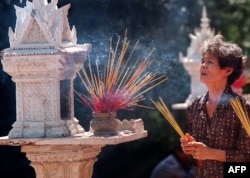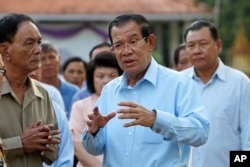The United States has imposed sanctions on the commander of Cambodian Prime Minister Hun Sen’s personal bodyguard unit over human rights abuses.
The sanctions target General Hing Bun Hieng, a member of the prime minister’s close inner circle. The move comes after the U.S. State Department and Senate repeatedly warned that the punitive measures would be forthcoming if Cambodia did not reverse recent anti-democratic actions, such as the dissolution of the opposition and jailing of its leader, Kem Sokha.
Any assets Hing Bun Hieng holds in the U.S. will be frozen while U.S. entities, including banks, will be banned from doing business with him, according to federal government regulations.
“General Bun Hieng commanded a Cambodian unit that engaged in a series of human rights abuses and was personally implicated in attacks against a number of individuals, including a U.S. citizen,” said Sigal Mandelker, a Treasury official, in a statement issued Tuesday.
Wat Phnom temple
The statement cited a deadly 1997 grenade attack that injured a U.S. citizen, an attack at the Wat Phnom Buddhist temple in 2013 and the savage beating of two opposition lawmakers in 2015.
The general, who is also a member of the ruling Cambodian People’s Party’s central committee and a deputy commander of the Royal Cambodian Armed Forces, brushed off the sanctions Wednesday.
“The United States doesn’t split the fish, but it splits the snail. I mean, I have no money. Anyone who has money, the U.S. should put pressure on. But it just puts pressure on me who has no money,” he said, chuckling.
“I do not know what the U.S. thinking is. This is its right — and it is the powerful country — if it wants to pressure someone. For me, I don’t care. I would like to say thanks, too. And if there is any wealth in the United States, freeze it quickly and take it all.”
The general said he had no properties or businesses in the United States and claimed that his involvement in the 2013 and 2015 incidents “followed the rule of law,” while denying culpability for the 1997 grenade attack.
Cambodia’s Ministry of Defense issued a press release saying it “regrets, denies, and condemns the U.S. Department of Treasury sanctions on Cambodian General Hing Bun Hieng by freezing his assets.”
The allegations
On March 30, 1997, four grenades were lobbed into a crowd of about 200 supporters of former opposition leader Sam Rainsy’s Khmer National Party in front of the then-National Assembly opposite Wat Botum Park. At least 16 people were killed, and more than 100 others injured.
Brigade 70, Hun Sen’s personal bodyguard unit, was deployed at the rally, and multiple eyewitnesses later told the FBI the soldiers allowed perpetrators to escape into a nearby pagoda before blocking those pursuing them.
Hing Bun Hieng was deputy commander of the unit and told The Phnom Penh Post afterward that he wanted to kill journalists who alleged Hun Sen’s bodyguards had been involved.
“Tell them that I want to kill them ... publish it. Say that I, chief of the bodyguards, have said this. I want to kill. ... I am so angry,” he reportedly said.
U.S. citizen Ron Abney, country director of the International Republican Institute, was injured, prompting the FBI investigation, which was never completed but had strongly suggested forces loyal to Hun Sen were responsible.
Violent crackdowns
Regarding what happened in 2013 at Wat Phnom, it is not entirely clear which incident the Treasury Department was referring to, as there were several violent crackdowns in the area that year. Officials from the U.S. embassy in Phnom Penh have not replied to a request for clarification.
In October 2015, Nhay Chamroeun and Kong Sakphea, lawmakers from the opposition Cambodia National Rescue Party, or CNRP, were dragged from their cars and beaten directly in front of the National Assembly.
Three PMBU members were convicted of the attack, which was caught on video. They were promoted upon their release from jail.
Experts divided on sanctions
Opinions are sharply divergent on whether sanctions will have any impact on a regime that has dissolved the country’s only viable opposition ahead of an election in late July.
Human Rights Watch has long lobbied for this type of action, and its deputy Asia director, Phil Robertson, said Wednesday the measure was “appropriate and overdue.”
“Well, they’ve got it right. You know he is the leader of an entity involved in serious human rights abuses and everybody knows it. I guess, I hope, this is the beginning,” he said.
Robertson rejected the argument that such sanctions could do more harm than good by pushing the country further into the orbit of China, which has eclipsed U.S. influence in Cambodia in recent years through unrivaled investment and infrastructure loans.
“You know, this whole game of ‘because China is involved we can’t say anything,’ is a recipe for lowest common denominator approaches toward an increasingly dictatorial rights-abusing government that, because it says it doesn’t care, people take them at their word.”
Lee Jones, an associate professor in international politics at Queen Mary University of London, said in an email that the sanctions move is “a purely symbolic action that will change nothing on the ground.”
“The Cambodian government has already taken a very nationalistic posture towards ‘external interference’ and painted the opposition as tools of foreign powers — this will only provide further ammunition, while not actively helping the opposition one iota,” he wrote.
The sanctions sent an “important message to Cambodia’s leadership that grave human rights violations will not go unpunished,” said Charles Santiago, a Malaysian lawmaker and chairperson of ASEAN Parliamentarians for Human Rights, in a statement.
“Particularly with elections on the horizon, we look forward to furthering concrete measures by the United States and other international actors to push back against government efforts to cripple democracy and human rights protections in Cambodia,” he wrote.






